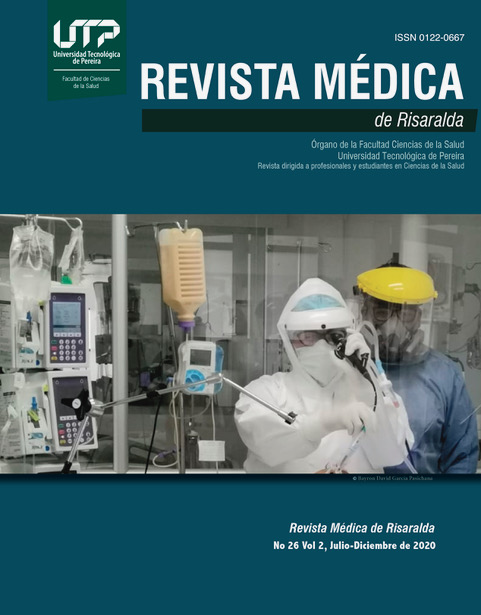Demographic and clinical factors that explain the progression of Chronic Kidney Disease in a nephroprotection program in the department of Nariño, Colombia between 2016-2018.
DOI:
https://doi.org/10.22517/25395203.24533Keywords:
Disease progression, type 2 Diabetes Mellitus, Arterial hypertension, Chronic kidney failure.Abstract
Introduction: Chronic Kidney Disease is a pathology of great impact on public health worldwide, its progression is determined by limitations in the control of its risk factors and prognosis. Nephroprotection programs monitor, control, and limit the progression of this disease in the patients while trying to lead them to meet the specific program goals.
Objective: To determine the factors that boost the progression of Chronic Kidney Disease in patients treated in a nephroprotection program.
Materials and methods: This retrospective analytical observational cohort study was carried out in 5872 patients from a nephroprotection program with different stages of Chronic Kidney Disease, in the department of Nariño between 2016 and 2018. The progression of CKD corresponded to a decrease in the Glomerular Filtration Rate by 5mL / min / 1.73 m2 or more; this information was obtained from the program's database. An explanatory model was built and adjusted taking into consideration demographic and clinical variables. According to the design, a binomial model with a logarithmic link function was used to estimate the regression coefficients of the variables of interest. The association measures were the Relative risks.
Results: In the final results it was found that 72.2% were women, 75.1% were 60 years old or older, 12.4% were afro-colombian, 85% were mixed race, and 49.2% presented progression (95% CI 47 , 9-50.4) of the cases. The factors that best explained the relationship between CKD progression were: being a man with an adjusted RR of 1.04 (95% CI: 1.00-1.15), and having a CKD stage of 4, 5 and 3a-b, with adjusted RR 1.62 (CI1.36-1.94) and 1.41 (CI1.21-1.63) respectively.
Conclusions: In the Nariño population of Colombia that is affiliated to a nephroprotection program the progression of CKD was 49.2% according to the male sex and the advanced stages of the condition.
Downloads
Downloads
-
Vistas(Views): 721
- PDF (Español (España)) Descargas(Downloads): 447
Published
How to Cite
Issue
Section
License
Cesión de derechos y tratamiento de datos
La aceptación de un artículo para su publicación en la Revista Médica de Risaralda implica la cesión de los derechos de impresión y reproducción, por cualquier forma y medio, del autor a favor de Facultad de Ciencias de la Salud de la Universidad Tecnológica de Pereira. 1995-2018. Todos los derechos reservados ®
por parte de los autores para obtener el permiso de reproducción de sus contribuciones. La reproducción total o parcial de los trabajos aparecidos en la Revista Médica de Risaralda, debe hacerse citando la procedencia, en caso contrario, se viola los derechos reservados.
Asimismo, se entiende que los conceptos y opiniones expresados en cada trabajo son de la exclusiva responsabilidad del autor, sin responsabilizarse ni solidarizarse, necesariamente, ni la redacción, ni la editorial.
Es responsabilidad de los autores poder proporcionar a los lectores interesados copias de los datos en bruto, manuales de procedimiento, puntuaciones y, en general, material experimental relevante.
Asimismo, la Dirección de la revista garantiza el adecuado tratamiento de los datos de carácter personal



